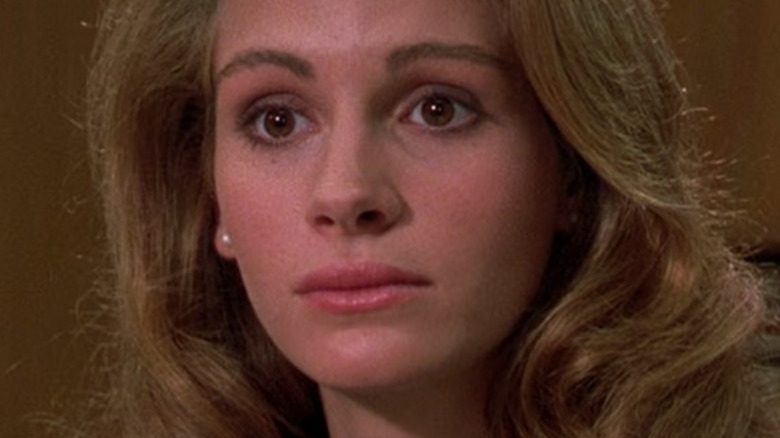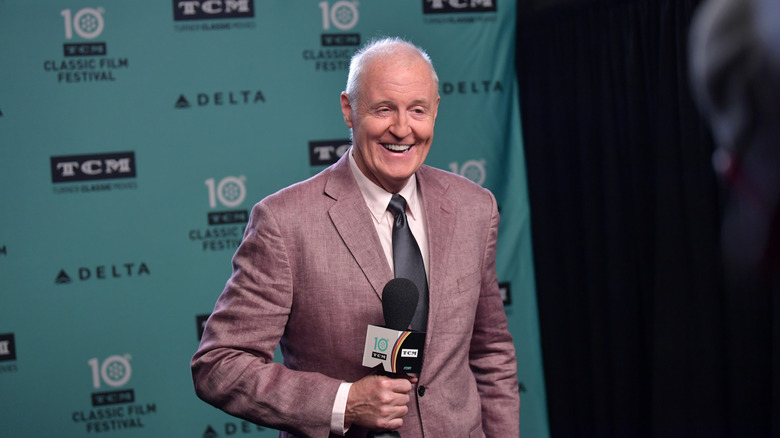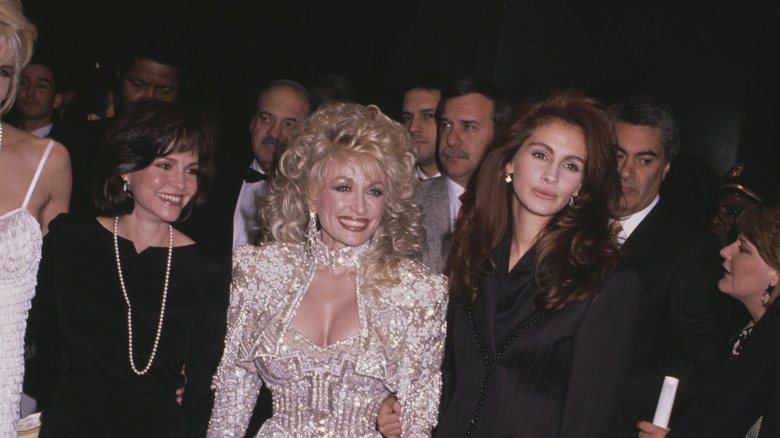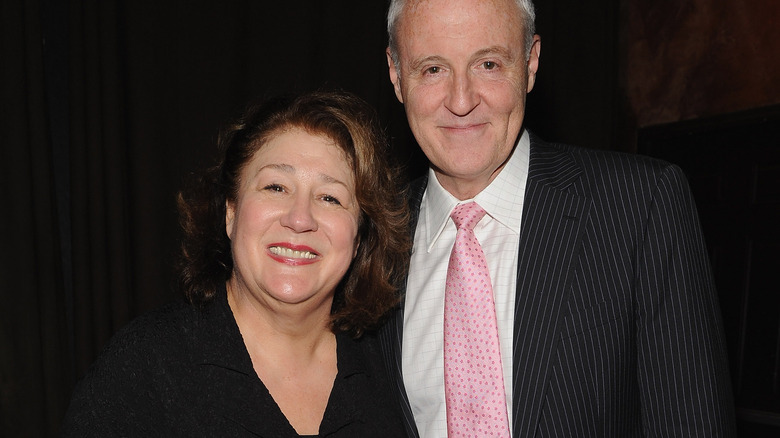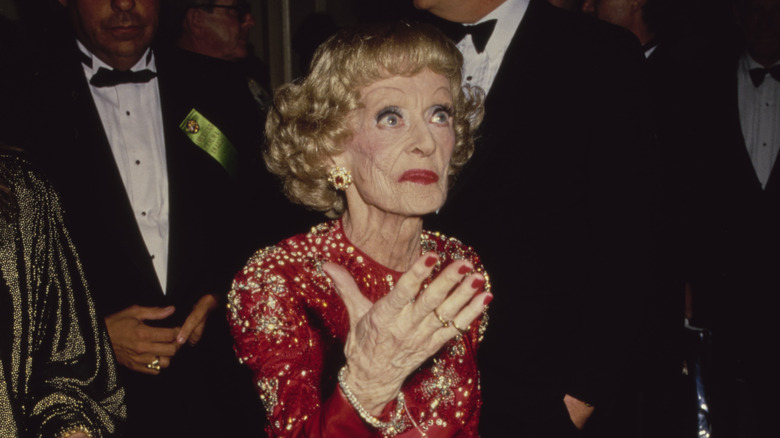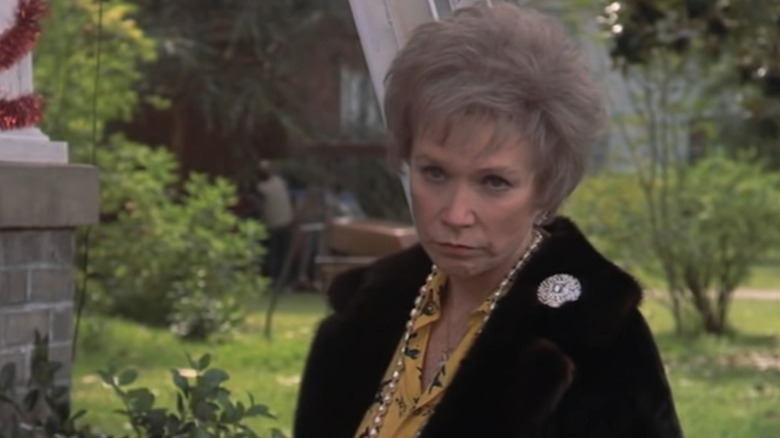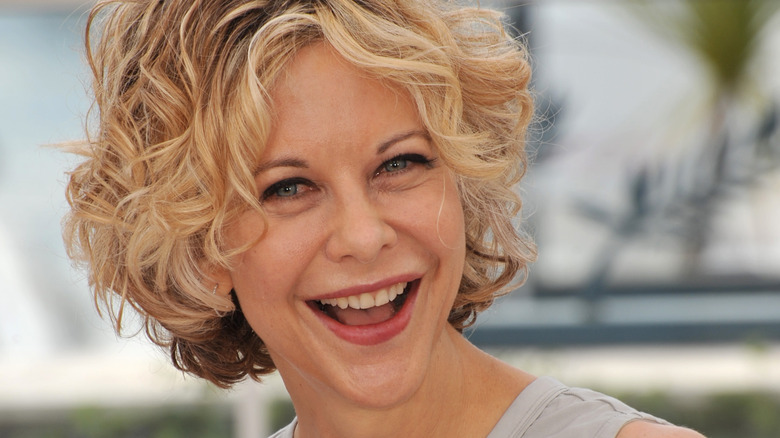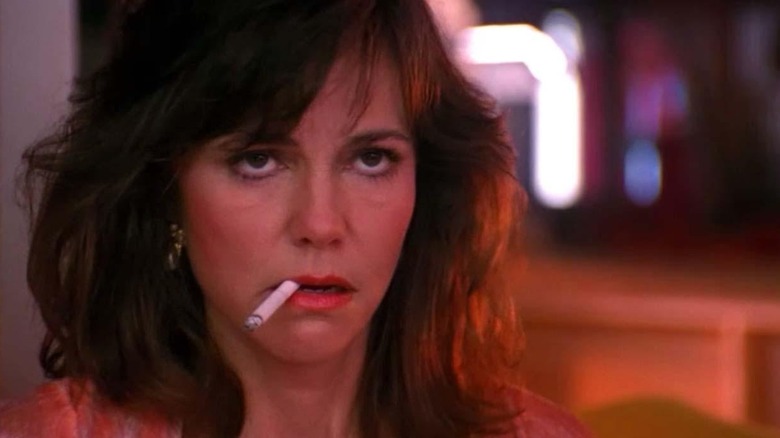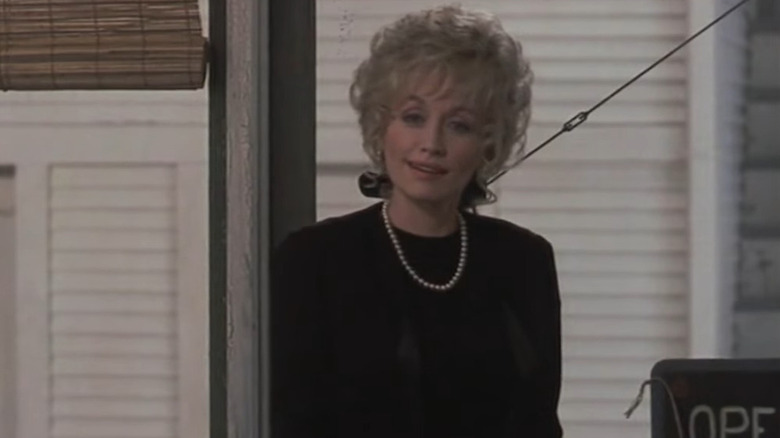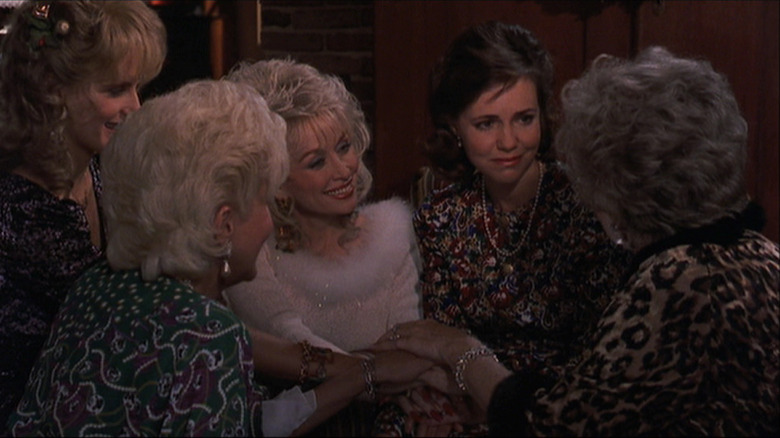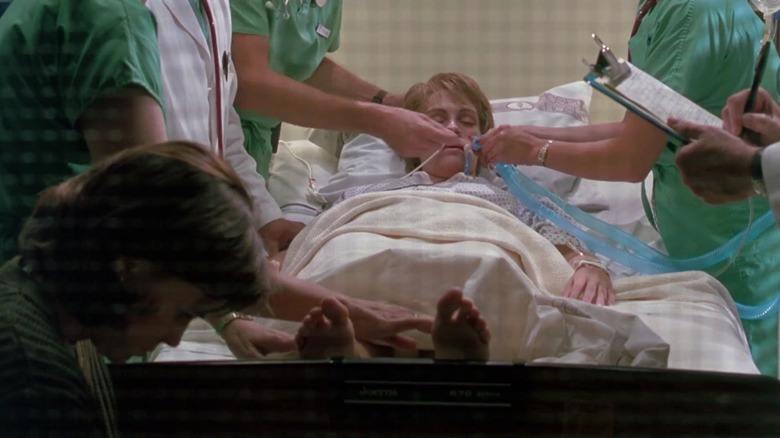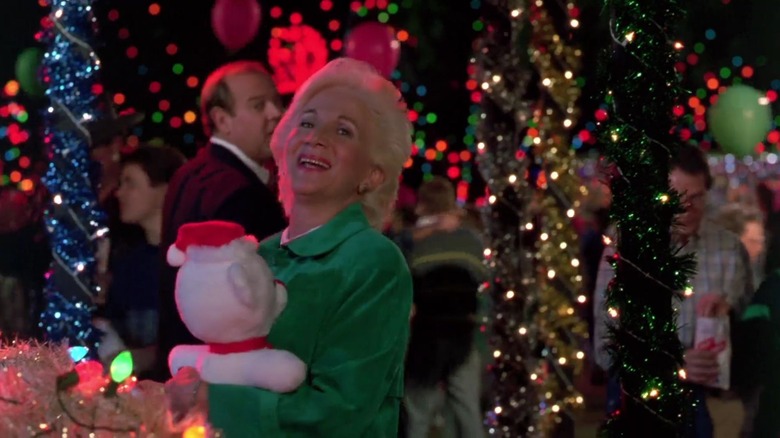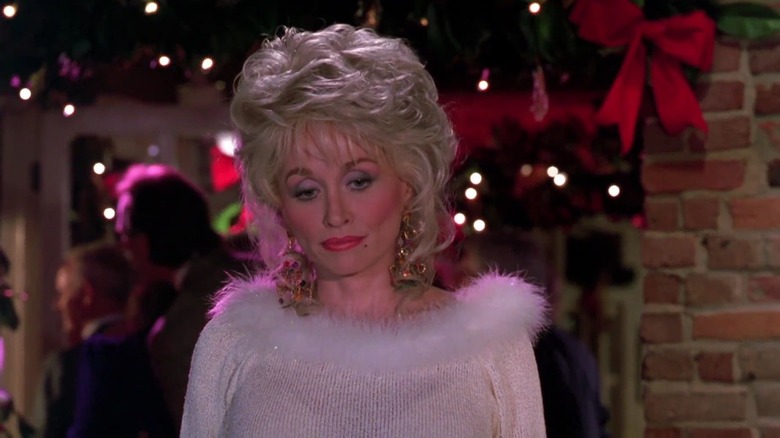The Untold Truth Of Steel Magnolias
When it comes to classic Southern movies, there's no denying that "Steel Magnolias" is one of the all-time greats. With a cast full of powerhouse women, it's no surprise the film became such a hit. Shot in Natchitoches, Louisiana – the hometown of writer Robert Harling — the film follows the lives, loves, and losses of a group of local women. There's big-hearted Truvy Jones (Dolly Parton), out-of-towner Annelle (Daryl Hannah), grumpy Ouiser (Shirley MacLaine), soon-to-be-married Shelby (Julia Roberts), and her protective mom, M'Lynn (Sally Field) — women who occasionally clash but ultimately all support each other.
"Steel Magnolias" could certainly be called a melodrama, but it's the heart-wrenching blend of comedy and tragedy that makes the film work. In his (mostly) positive review of the film, Roger Ebert wrote wrote, "'Steel Magnolias' is essentially a series of comic one-liners leading up to a teary tragedy, but let it be said that the one-liners are mostly funny and the tragedy deserves most, but not all, of the tears." (Allow us to disagree slightly and say it does indeed deserve all the tears.) Considering the ample talents of its cast, it's no wonder the film's leading ladies were able to pull off both its playful and poignant moments.
You may think you know the story of "Steel Magnolias," but do you, really? Keep reading to discover the secrets behind the making of the beloved film.
The original play was written in 10 days
For "Steel Magnolias" writer Robert Harling, he didn't have to go far to find inspiration for the script. The film version of "Steel Magnolias" was based on Harling's play, which in turn was based on the events of Harling's real life. In 1985, Harling's sister, Susan, died from complications of type 1 diabetes, shortly after the birth of her first child. Because the play was based on his own life, Harling told Today it only took him 10 days to write. "10 days later, that's all it took because I had lived the story," he explained.
Initially, the play was meant to be a short story. Harling was intent on preserving his sister's memory, both for himself and for his nephew, who was only 2 at the time. "All I wanted to do was have somebody remember her," he told Country Living. But as he began working on the short story, he realized it was missing something essential — the voices of these women, the titular "steel magnolias." As Harling told Today, "I missing the sound of the wonderful vernacular." Turning the story into a play was the perfect solution. "It became a play because I wanted to hear the dialogue. And that was it."
Steel Magnolias wasn't written as a comedy
Though "Steel Magnolias" ends with tragedy, there are plenty of funny moments sprinkled throughout. However, despite the many one-liners, Robert Harling actually didn't set out to write a comedy. Margo Martindale, who originated the role of Truvy on the stage, recalled the experience of doing the play in front of an audience for the first time. "We played it like a drama," she told Garden & Gun. "We all thought it was a drama, and then the first night it was in front of an audience, we were shocked. It was riotously funny and played straight as an arrow." She went on to say that the actors never thought they were delivering jokes, they were just talking like a group of women from Louisiana would.
Robert Harling remembers the opening of the play similarly. He'd originally thought of the play as a tragedy, but things changed when audiences got a hold of it. "It wasn't until audiences came in and started responding to the way the women talked and how wonderful the actresses were that we realized, I guess this is funny — until it's not," he told Country Living.
Though Harling and Martindale may not have meant it that way, it's this precise blend of humor and tragedy that makes the film such a success. You're laughing and having a good time until, to paraphrase Harling, you're not. It's a gut punch made all the more impactful by the levity that's preceded it.
The role of Truvy was written for Margo Martindale
Margo Martindale was exactly who writer Robert Harling had in mind when we wrote the role of Truvy, which is why she originated the character in the play. Martindale's East Texas hometown of Jacksonville isn't that far from Natchitoches, Louisiana, Harling's own hometown and the inspiration for the play's setting.
Harling told Garden & Gun that he loved Martindale's voice, so he came up with the name "Truvy" to fit her. "Bobby and I were introduced by our commercial agent, and it was instant love" Martindale said. "From the moment we met, he tailor-made the part for me." As for the film adaptation, Martindale said that they did let her audition for a part, but it was basically just a courtesy gesture. However, she wasn't angry that Parton wound up with the role. "Truvy's all about heart, and Dolly Parton has a big heart," she said.
Though the role of Truvy may have been written for Martindale, she returned to the play for a very different character in celebration of its 25th anniversary. In 2012, Martindale graced the stage once more, only this time as Ouiser, Shirley MacLaine's role in the film. Martindale spoke with Entertainment Tonight about what it was like to play the part, saying Ouiser is really just the "flip side" of Truvy. "I think I'm more like Ouiser now than I was like Truvy. So it's kind of perfect," she explained.
All of Hollywood's top stars wanted to be in the film
When it was announced that "Steel Magnolias" was going to be turned into a film, many of Hollywood's top leading ladies flocked to go see the play, as Margo Martindale recalled on "Live with Kelly and Ryan." Stars like Lucille Ball, Cher, and the "Golden Girls" cast came to see the show, Robert Harling told Garden & Gun. When Elizabeth Taylor attended, they had to shut down the entire street in preparation.
Harling was slightly nervous for Taylor to see the play because that meant she would have to sit there and hear the line "when it comes to suffering, she's right up there with Elizabeth Taylor" in real-time. Harling's fears turned out to be unfounded because, as he put it, "No one laughed harder than she did."
Harling also got word from another Hollywood legend about her interest in the film. According to The Morning Call, an elderly Bette Davis invited the writer for tea in order to offer herself up for the role of Ouiser. However, the film's producer worried Davis wouldn't be able to stand the extreme Louisiana heat, but still, it's fascinating to think about these Hollywood legends and how they would've played these iconic parts.
Shirley MacLaine got to choose the character she played
While many of Hollywood's top actresses were vying for roles in "Steel Magnolias," Shirley MacLaine didn't have to fight anyone for her part. MacLaine told Garden & Gun that director Herbert Ross called her up and told her she could choose any role she wanted, apart from M'Lynn and Shelby. MacLaine looked over the script and said, "I want to play the really b****y one." Looking back on the decision, MacLaine said, "I think I was rehearsing for my old age. I was seeing if I could get away with saying what I negatively felt and still be funny. And it's kind of turned out that way, actually."
It did indeed turn out that way, as MacLaine -– who got her start playing, sweet, if somewhat weird characters in films like "The Apartment" and "Sweet Charity" in the 1960s –- is now known for playing troublesome, often cranky characters like Ouiser. Three years later, MacLaine went on to play Meryl Streep's mother in "Postcards from the Edge," a film partially based on Carrie Fisher's struggles with drugs and alcohol and her complicated relationship with her mother, Debbie Reynolds.
Meg Ryan turned down the role of Shelby
The competition for the roles of the older characters in "Steel Magnolias" may have been stiff, but it wasn't any simpler to cast for the role of Shelby, M'Lynn's daughter and the character based on Harling's own sister. Shelby was the last character to be cast, and they initially offered the role to Meg Ryan. Ryan, who'd recently been featured in "Top Gun," wound up turning them down because she just got offered the lead role in "When Harry Met Sally" and didn't want to take an ensemble part, Harling told Garden & Gun. After that, they went back to their list of the hottest Hollywood starlets of the era, with names like Laura Dern and Winona Ryder.
Producer Ray Stark had the idea to open the role up to some lesser-known actors, and he came up with the name Julia Roberts, who couldn't previously audition because she'd been working on "Mystic Pizza." Everyone involved in the film knew that Roberts was the right fit from the moment she stepped into the room, and to make matters even more enticing, she was a born-and-bred Southerner. Co-star Shirley MacLaine remembers the moment perfectly: "The moment Julia walked into the reading, I thought, 'That woman is going to be a star.' For his part, Harling was just relieved that his sister was finally "in good hands."
The idea for Soapdish was created on the set of Steel Magnolias
While the idea for "Steel Magnolias" came straight from screenwriter Robert Harling's life, the idea for his next film came in a much more casual manner. According to the Chicago Tribune, Field and Harling majorly connected over their love of soap operas, and during the filming of "Steel Magnolias," the two began discussing a potential new project together. As Field put it, "We were thinking of a character I hadn't done, and he suggested your basic b***. And I said, 'Yeah, that would be great."
Harling's version of events are pretty much the same. Speaking with Garden & Gun, Harling explained that Field told him, "I've always wanted to play a b*** who gets to wear nice clothes." In addition to playing so far against type, Field also wanted to make a project about the craziness of acting and show business. All these discussions eventually inspired Harling to write "Soapdish," the 1991 film starring Field, Kevin Kline, Robert Downey Jr., Elisabeth Shue, and Whoopi Goldberg, among others. The film tells the behind-the-scenes story of a popular American sitcom, of which Field's character is the star.
The director allegedly wasn't very nice to Julia Roberts and Dolly Parton
Though "Steel Magnolias" director Herbert Ross wound up making a great movie, he isn't remembered all that fondly by some of the cast, as many recall he was very mean to some of the actresses, picking on Julia Roberts in particular. Speaking at an event in 2013, Sally Field recalled how the director treated Roberts. "He went after Julia with a vengeance," she said, adding, "This was pretty much her first big film." Shirley MacLaine also witnessed Ross' bad behavior, but she also remembers how it made the cast that much closer. More experienced members of the cast like MacLaine didn't put up with Ross's behavior. "One day I basically told him to go f*** himself, and everybody heard it, and things got better," MacLaine told Garden & Gun.
Hollywood icon Julia Roberts wasn't the only one Ross went after on set. If you can believe it, he even tried to bully the Queen of Country herself, Dolly Parton. Ross once told Parton that she should go take some acting lessons because she couldn't act. Field was incensed by this –- "You don't say that to Dolly Parton!" she exclaimed. But Parton took it all in stride and never once backed down. In her 1994 autobiography, "Dolly: My Life and Other Unfinished Business," Parton said she told Ross, "I'm not an actress, I'm Dolly Parton. I'm a personality who has been hired to do this movie. You're the director. It's your job to make me look like I'm acting." Parton maintained that they were all friends by the end of the film, but as MacLaine bluntly put it, "We never went to the director's funeral."
The cast hung out with the writer's real family
"Steel Magnolias" was filmed in writer Robert Harling's actual hometown of Natchitoches, Louisiana, which meant the cast and crew also had the opportunity to hang out with the locals, including Harling's own family. Harling told Garden & Gun that the entire cast rented houses in the area, and Tom Skerrit — the actor who played Harling's father in the film — lived right next door to his actual father.
The writer recalled that were always having cookouts together, which was a really special experience for the entire cast and crew. Harling's mother was especially prolific in the kitchen, and Harling said her famous coconut cake was a hit. "Mama was churning out her coconut cakes as fast as she could. There was always one on the counter, one in the oven, and at least one in the freezer."
Julia Roberts had the unique experience of actually getting to spend time with the parents of the character she was playing. "Julia was so eager to have the stamp of approval from Mama and Daddy to play their daughter," Harling said. He recalled the days when Roberts would come over to the house and his father would cook hamburgers and chat with her. Roberts would write and read her poetry to everyone, and Parton would come over and play her guitar. Harling called the experience "beyond surreal."
The truth about Steel Magnolia's nurse
As it's based on a true story, there are plenty of connections between "Steel Magnolias" and Robert Harling's real life. But one of these connections is even more touching when you know the real story behind it.
Shelby, the character Julia Roberts plays in the film, is based on Harling's sister, Susan, who died of complications from type 1 diabetes in 1985. As reported by the Huffington Post, in what's perhaps the most poignant casting choice in the entire film, the nurse who turns off Shelby's life support in the movie is the same nurse who switched off Susan's life support in real life.
Filming the scene was already heart-wrenching enough for Harling and the cast, and it was made all the more intense by the fact that Harling's mother had decided to be on set the day of filming. Harling told her not to because he thought it would be too traumatic, but she insisted, having grown close to Roberts by this point in shooting. Harling came over to check on his mother after they shot the scene, wondering why she went through with it. "I wanted to see Julia get up and walk away," Harling's mother responded. At this point, Harling finally understood why his mother wanted to be there. In some ways, the scene was actually a cathartic moment for the whole family.
They shot Christmas in August
Though "Steel Magnolias" takes place over the course of an entire year, one of the most memorable sequences in the film takes place around Christmas. The women of "Steel Magnolias" attend a Christmas festival in the movie, but the festival itself was all movie magic. They actually shot the Christmas scenes in August, in the sweltering Louisiana heat. The entire cast was wearing sweaters, parkas, and fur, even though it was 100 degrees, reports Today. Nonetheless, the cast remained in good spirits.
Shooting Christmas in August may seem like a whole lot of effort, but it was important to Harling that the scenes be included in the film, as his sister was a big fan of the season and its festivities. "[Susan] loved the Christmas festival, which was the first weekend in every December," Harling said. "She never missed it." It's hard to argue with that.
Dolly Parton didn't act like a diva
"Steel Magnolias" was filmed on location in Louisiana, which meant the actors had to contend with the swampy, muggy heat the Southern state is known for. Speaking with Closer, Shirley MacLaine admitted that the cast complained about the temperature, all except for one person — the one and only Dolly Parton. As MacLaine told Variety, "[Parton] was the only one tied up in a corset with a wig and high heels that she would lose her breath. And she was the only one who didn't sweat and didn't complain in the heat."
Parton had her own reasoning for acting the way she did, and it was something of a personal ethos for her. Speaking with Garden & Gun, Harling recalled one day while they were shooting a scene in the summer heat, and Parton was wearing a white cashmere sweater with down feathers around her neck. Roberts finally asked Parton why she never complained, and Parton responded in a typically wise and witty fashion. "When I was young and had nothing, I wanted to be rich and famous, and now I am," she responded. "So I'm not going to complain about anything."
